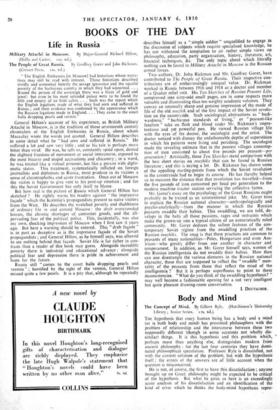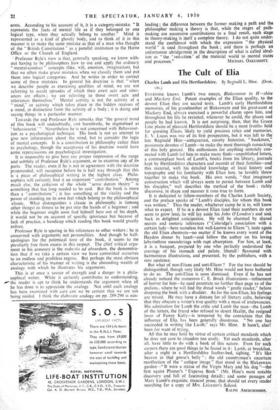Body and Mind
1he Concept of Mind. By Gilbert Ryle. (Hutchinson's University Library ; Senior Series. 2S. 6d.) THE hypothesis that every human being has a body and a mind (or is both body and mind) has presented philosophers with the problem of relationship and the intercourse between these two supposedly different (though in some accounts not wholly dis- similar) things. It is this hypothesis and this problem which, perhaps more than anything else, distinguishes modern frOm ancient philosophy ; for the last four centuries they have domi- nated philosophical speculation. Professor Ryle is dissatisfied, not with the current solution of the problem, but with the hypothesis itself ; the errors of the answers are of little account when the question is misconceived.
He is not, of course, the first to have this dissatisfaction ; anyone brought up on Greek philosophy might be expected to be critical of the hypothesis. But what he gives us here is an exceedingly. acute analysis of his dissatisfaction and an identification of the kind of error which he thinks the body-mind hypothesis repre- - sents. According to his account of it, it is a category-mistake. "It represents the facts of mental life as if they belonged to one logical type, when they actually belong to another." Mind is represented as a kind of ghostly body, and to think of it in this manner is to make the same mistake as that of a man who thought of the " British Constitution " as a parallel institution to the Home Office or the Church of England.
' Professor Ryle's view is that, generally speaking, we know with- out having to be philosophers how to use and apply the ordinary " mental-conduct " concepts (like, will, emotion, imagination), but that we often make grave mistakes when we classify them and put them into logical categories. And he writes in order to correct some of these mistakes. In general his doctrine is that " when we describe people as exercising qualities of mind, we are not referring to occult episodes of which their overt acts and utter- ances are effects ; we are referring to those overt acts and utterances themselves." Mental activity is not the activity of a " mind," or activity which takes place in the hidden recesses of a mind, in distinction from the activity of a body ; it is doing and saying things in a particular manner.
Towards the end Professor Ryle remarks that "the general trend of this book will undoubtedly, and harmlessly, be stigmatised as
behaviourist.' " Nevertheless he is not concerned with Behaviour- ism as a psychological technique. His book is not an attempt to give new information about the mind, but to consider the logic of mental concepts. It is a contribution to philosophy rather than to psychology, though the acceptance of his doctrine would have some repercussions on psychological investigation.
It is impossible to give here any proper impression of the range and subtlety of Professor Ryle's argument, or to examine any of its parts. The reader, even if he is not in agreement with the doctrine propounded, will recognise before he is half way through that this is a piece of philosophical writing in the highest class. Philo- sophers will certainly find it an important " contribution." Among much else, the criticism of the whole " sense datum theory " is something that has long needed to be said. But the book is more than a "contribution " ; it has something of the vitality and the power of standing on its own feet which belong to the philosophical classic. What distinguishes a classic in philosophy is (among other things) its fitness to be put into the hands of a beginner ; and while the beginner might soon find hirilself here out of his depth, it would not be on account of specific ignorance but because of lack of practice, a handicap which reading this book would greatly reduce.
Professor Ryle is sparing in his references to other writers ; he is concerned with arguments not personalities. And though he half- apologises for the polemical tone of the book, it seems to me
peculiarly free from excess in this respect. The chief critical argu- ment in his armoury is the reductio ad absurdum, the demonstra-
tion that if we take a certain view we have committed ourselves to an endless and profitless regress. But perhaps the most obvious characteristic of his manner of writing is the abounding wealth of analogy with which he illustrates his arguments.
This is at once a source of strength and a danger in a philo- sophical writer. While it certainly contributes to understanding, o•-"the reader is apt to think he understands the argument when all he has done is to appreciate the analogy. Not until each analogy has been examined with care can we be certain that we are not being misled. I think the elaborate analogy on pp. 289-290 is mis-
leading ; the difference between the farmer making a path and the philosopher making a theory is that, while the stages of path- making are successive contributions to a final result, each stage in theory-making is itself a complete theory. I do not quite under- stand the confidence with which the expression " the physical world " is used throughout the book ; and there is perhaps an unfortunate abridgement in the description of what is called ideal- ism as " the reduction' of the material world to mental states







































 Previous page
Previous page